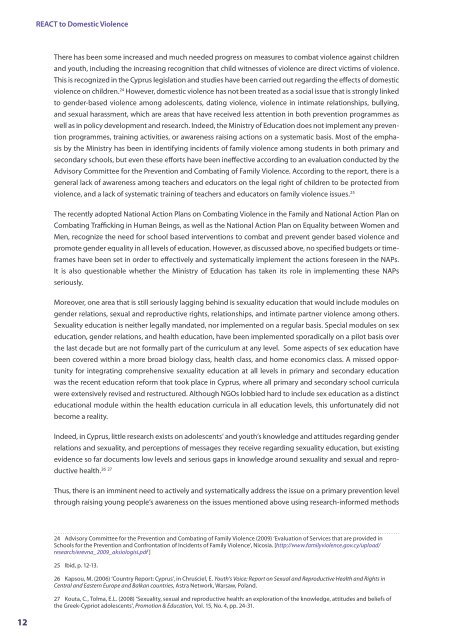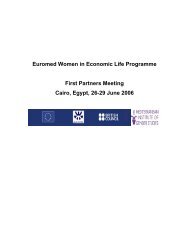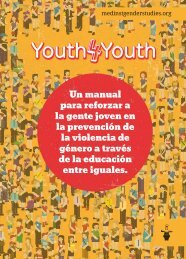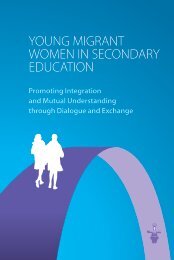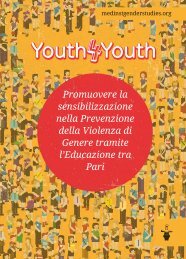react to domestic violence
react to domestic violence
react to domestic violence
You also want an ePaper? Increase the reach of your titles
YUMPU automatically turns print PDFs into web optimized ePapers that Google loves.
REACT <strong>to</strong> Domestic Violence<br />
There has been some increased and much needed progress on measures <strong>to</strong> combat <strong>violence</strong> against children<br />
and youth, including the increasing recognition that child witnesses of <strong>violence</strong> are direct victims of <strong>violence</strong>.<br />
This is recognized in the Cyprus legislation and studies have been carried out regarding the effects of <strong>domestic</strong><br />
<strong>violence</strong> on children. 24 However, <strong>domestic</strong> <strong>violence</strong> has not been treated as a social issue that is strongly linked<br />
<strong>to</strong> gender-based <strong>violence</strong> among adolescents, dating <strong>violence</strong>, <strong>violence</strong> in intimate relationships, bullying,<br />
and sexual harassment, which are areas that have received less attention in both prevention programmes as<br />
well as in policy development and research. Indeed, the Ministry of Education does not implement any prevention<br />
programmes, training activities, or awareness raising actions on a systematic basis. Most of the emphasis<br />
by the Ministry has been in identifying incidents of family <strong>violence</strong> among students in both primary and<br />
secondary schools, but even these efforts have been ineffective according <strong>to</strong> an evaluation conducted by the<br />
Advisory Committee for the Prevention and Combating of Family Violence. According <strong>to</strong> the report, there is a<br />
general lack of awareness among teachers and educa<strong>to</strong>rs on the legal right of children <strong>to</strong> be protected from<br />
<strong>violence</strong>, and a lack of systematic training of teachers and educa<strong>to</strong>rs on family <strong>violence</strong> issues. 25<br />
The recently adopted National Action Plans on Combating Violence in the Family and National Action Plan on<br />
Combating Trafficking in Human Beings, as well as the National Action Plan on Equality between Women and<br />
Men, recognize the need for school based interventions <strong>to</strong> combat and prevent gender based <strong>violence</strong> and<br />
promote gender equality in all levels of education. However, as discussed above, no specified budgets or timeframes<br />
have been set in order <strong>to</strong> effectively and systematically implement the actions foreseen in the NAPs.<br />
It is also questionable whether the Ministry of Education has taken its role in implementing these NAPs<br />
seriously.<br />
Moreover, one area that is still seriously lagging behind is sexuality education that would include modules on<br />
gender relations, sexual and reproductive rights, relationships, and intimate partner <strong>violence</strong> among others.<br />
Sexuality education is neither legally mandated, nor implemented on a regular basis. Special modules on sex<br />
education, gender relations, and health education, have been implemented sporadically on a pilot basis over<br />
the last decade but are not formally part of the curriculum at any level. Some aspects of sex education have<br />
been covered within a more broad biology class, health class, and home economics class. A missed opportunity<br />
for integrating comprehensive sexuality education at all levels in primary and secondary education<br />
was the recent education reform that <strong>to</strong>ok place in Cyprus, where all primary and secondary school curricula<br />
were extensively revised and restructured. Although NGOs lobbied hard <strong>to</strong> include sex education as a distinct<br />
educational module within the health education curricula in all education levels, this unfortunately did not<br />
become a reality.<br />
Indeed, in Cyprus, little research exists on adolescents’ and youth’s knowledge and attitudes regarding gender<br />
relations and sexuality, and perceptions of messages they receive regarding sexuality education, but existing<br />
evidence so far documents low levels and serious gaps in knowledge around sexuality and sexual and repro-<br />
26 27<br />
ductive health.<br />
Thus, there is an imminent need <strong>to</strong> actively and systematically address the issue on a primary prevention level<br />
through raising young people’s awareness on the issues mentioned above using research-informed methods<br />
24 Advisory Committee for the Prevention and Combating of Family Violence (2009) ‘Evaluation of Services that are provided in<br />
Schools for the Prevention and Confrontation of Incidents of Family Violence’, Nicosia. [http://www.family<strong>violence</strong>.gov.cy/upload/<br />
research/erevna_2009_aksiologisi.pdf ]<br />
25 Ibid, p. 12-13.<br />
26 Kapsou, M. (2006) ‘Country Report: Cyprus’, in Chruściel, E. Youth’s Voice: Report on Sexual and Reproductive Health and Rights in<br />
Central and Eastern Europe and Balkan countries, Astra Network, Warsaw, Poland.<br />
27 Kouta, C., Tolma, E.L. (2008) ‘Sexuality, sexual and reproductive health: an exploration of the knowledge, attitudes and beliefs of<br />
the Greek-Cypriot adolescents’, Promotion & Education, Vol. 15, No. 4, pp. 24-31.<br />
12


